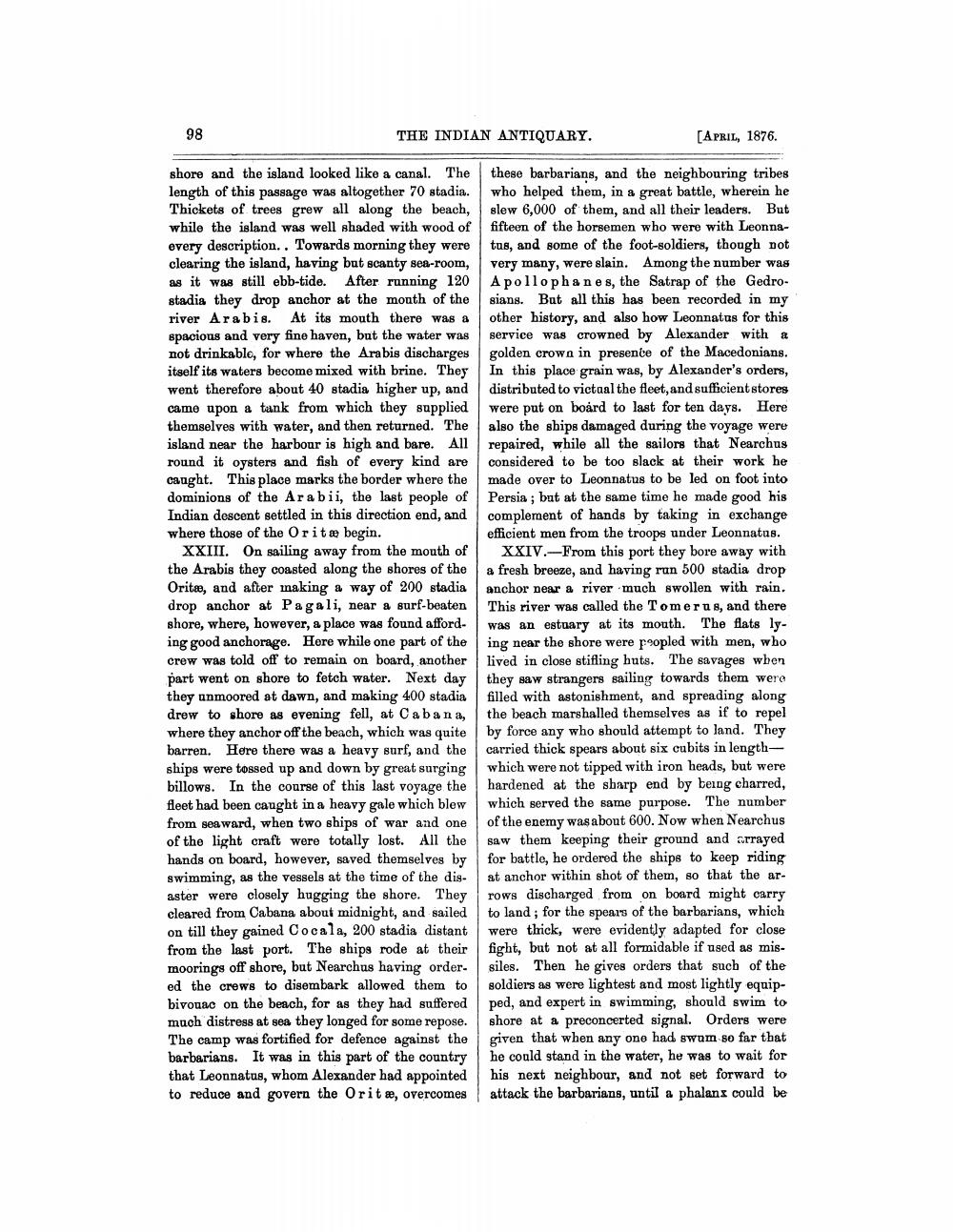________________
98
THE INDIAN ANTIQUARY.
[APRIL, 1876.
shore and the island looked like a canal. The length of this passage was altogether 70 stadia. Thickets of trees grew all along the beach, while the island was well shaded with wood of every description.. Towards morning they were clearing the island, having but scanty sea-room, as it was still ebb-tide. After running 120 stadia they drop anchor at the mouth of the river Arabis. At its mouth there was a spacious and very fine haven, but the water was not drinkable, for where the Arabis discharges itself its waters become mixed with brine. They went therefore about 40 stadia higher up, and came upon a tank from which they supplied themselves with water, and then returned. The island near the harbour is high and bare. All round it oysters and fish of every kind are caught. This place marks the border where the dominions of the Arabii, the last people of Indian descent settled in this direction end, and where those of the Orite begin.
XXIII. On sailing away from the mouth of the Arabis they coasted along the shores of the Oritæ, and after making a way of 200 stadia drop anchor at Pagali, near a surf-beaten shore, where, however, a place was found afford ing good anchorage. Here while one part of the crew was told off to remain on board, another part went on shore to fetch water. Next day they onmoored at dawn, and making 400 stadia drew to shore as evening fell, at Cabana, where they anchor off the beach, which was quite barren. Here there was a heavy surf, and the ships were tossed up and down by great surging billows. In the course of this last voyage the fleet had been caught in a heavy gale which blew from seaward, when two ships of war and one of the light craft were totally lost. All the hands on board, however, saved themselves by swimming, as the vessels at the time of the disaster were closely hugging the shore. They cleared from Cabana about midnight, and sailed on till they gained Cocala, 200 stadia distant from the last port. The ships rode at their moorings off shore, but Nearchus having order. ed the crews to disembark allowed them to bivouac on the beach, for as they had suffered much distress at sea they longed for some repose. The camp was fortified for defence against the barbarians. It was in this part of the country that Leonnatus, whom Alexander had appointed to reduce and govern the Oritæ, overcomes
these barbarians, and the neighbouring tribes who helped them, in a great battle, wherein he slew 6,000 of them, and all their leaders. But fifteen of the horsemen who were with Leonnatus, and some of the foot-soldiers, though not very many, were slain. Among the number was Apollophanes, the Satrap of the Gedrosians. But all this has been recorded in my other history, and also how Leonnatus for this service was crowned by Alexander with a golden crown in presence of the Macedonians. In this place grain was, by Alexander's orders, distributed to victaal the fleet, and sufficient stores were put on board to last for ten days. Here also the ships damaged during the voyage were repaired, while all the sailors that Nearchus considered to be too slack at their work he made over to Leonnatus to be led on foot into Persia; but at the same time he made good his complement of hands by taking in exchange efficient men from the troops under Leonnatus.
XXIV.-From this port they bore away with a fresh breeze, and having run 500 stadia drop anchor near a river much swollen with rain. This river was called the Tomerus, and there was an estuary at its mouth. The flats lying near the shore were peopled with men, who lived in close stifling huts. The savages when they saw strangers sailing towards them were filled with astonishment, and spreading along the beach marshalled themselves as if to repel by force any who should attempt to land. They carried thick spears about six cubits in lengthwhich were not tipped with iron heads, but were hardened at the sharp end by being charred, which served the same purpose. The number of the enemy was about 600. Now when Nearchus saw them keeping their ground and crrayed for battle, he ordered the ships to keep riding at anchor within shot of them, so that the arrows discharged from on board might carry to land; for the spears of the barbarians, which were thick, were evidently adapted for close fight, but not at all formidable if used as missiles. Then he gives orders that such of the soldiers as were lightest and most lightly equipped, and expert in swimming, should swim to shore at a preconcerted signal. Orders were given that when any one had swum so far that he could stand in the water, he was to wait for his next neighbour, and not set forward to attack the barbarians, until a phalans could be




